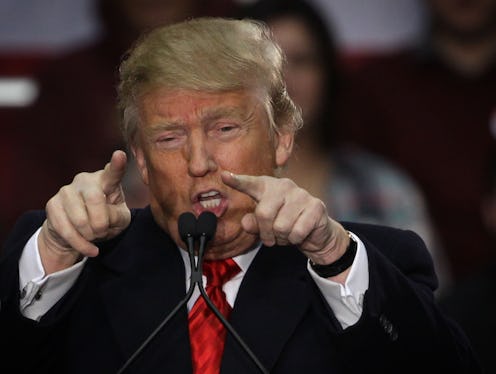News
Push Polls Are Making Donald Trump Angry
As the remaining Republican presidential candidates continue to battle and bruise each other in their quest for the nomination, newly re-crowned front-runner Donald Trump accused Ted Cruz of running push polls. The Washington Post reported on Thursday that South Carolinians were being subjected to push polls by what appeared to be Cruz supporters, giving Trump all the incentive he needed — which, let's be real, is never that much to begin with — to attack his closest GOP rival in a Twitter tirade. "We are getting reports from many voters that the Cruz people are back to doing very sleazy and dishonest 'push polls' on me. We are watching!" Trump tweeted Thursday night, unleashing a stream of social media allegations against the Texas senator.
Marco Rubio's campaign has also piled on the push poll criticism. Though not outright accusing Cruz of orchestrating the push polls, Rubio spokesman Alex Conant tweeted out the Washington Post article that broke news of the push poll accusation. Cruz has flat-out denied any involvement with the push poll in question. According to Politico, Cruz told reporters on Thursday, "I have no idea. We had nothing to do with them. I don't know what they were. We had nothing to do with them. So I had read reports of what is being said but somebody else is doing them, not us."
As the mudslinging broke out in full force, some political outsiders were simply wondering: What is push polling, and why is it such a nasty political move? Push polling is a sneaky way to (attempt to) influence voters through a seemingly innocuous set of survey or polling questions. People may think they are getting a typical robo-call, but the responses they receive when they reveal their preferences reflect a clear bias; the questions themselves may be structured to specifically slam or praise a candidate.
For example, the Washington Post article reported that Natalie Barrett, a South Carolina voter, received what she thought was a typical robo-call, which proceeded to ask her about her preferences in regards to Republican candidates. When she noted she liked Rubio, she said the robo-call responded by criticizing the Florida senator:
That’s when he said, ‘Did you know that Marco Rubio and the Gang of Eight are for amnesty?’ she recalled in a phone interview. 'And then the gentleman said he’s for letting 11 million illegal immigrants stay in the U.S. and that he was for letting Syrians cross the borders freely.'
Push polling is hardly a new tactic in the world of political campaigning. During Barack Obama's first presidential campaign in 2008, some Jewish voters said they had experienced push polling. After noting they were Jewish during what they thought was a basic robo-call, some were then asked: "Would it change your mind about Obama if you knew that his church was anti-Israel? Would it change your mind if you knew that the leaders Hamas had endorsed Obama? Would it change your mind if you knew he had met with the leaders of Hamas?" Politico reported. Political strategist Karl Rove has been accused of orchestrating push polls that insinuated during the 2000 race for the Republican nomination that John McCain had "fathered an African-American 'love child' (he had actually adopted a girl from Bangladesh)" and was "suffering from mental instability as a result of his incarceration in Vietnam," The Atlantic reported.
Based on how the race for the White House has only heated up, it doesn't look like the push polling or other cutthroat tactics will disappear anytime soon from this election.
